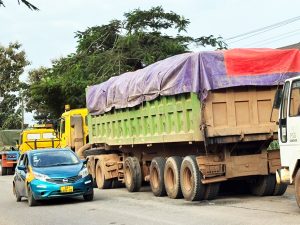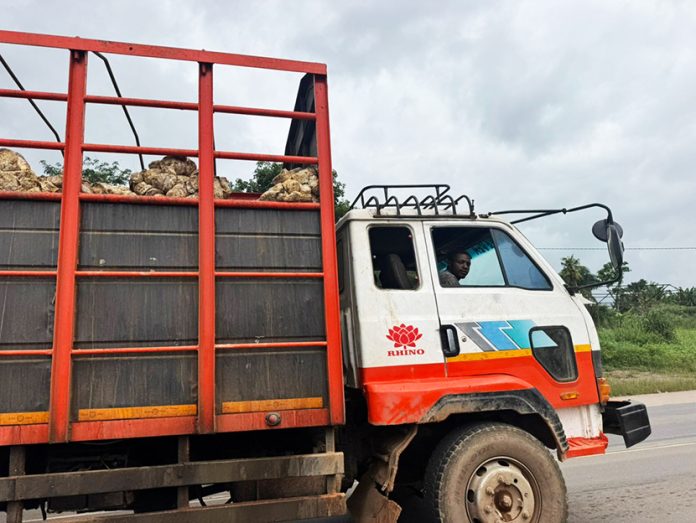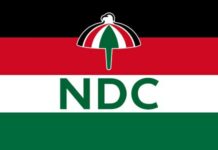Ghana’s enforcement of new export regulations for unprocessed rubber appears to be severely ineffective, as truckloads of raw rubber are reportedly being transported to Tema, with industry observers now characterising these activities as blatant smuggling, occurring directly under the oversight of the Tree Crop Development Authority (TCDA).
Mandated by The Tree Crop Development Act, 2019 (Act 1010) and the Tree Crop Regulation, 2023 (L.I. 2471), the TCDA is responsible for regulating and developing six primary tree crops: rubber, cashew, shea, mango, coconut and oil palm.
In May 2025, the Authority issued a directive requiring all exporters of unprocessed rubber, cashew and shea to secure a written permit prior to export.

This measure, grounded in Regulation 50 of LI 2471, was intended to safeguard local processors and ensure adherence to regulatory standards.
However, investigations and photographic evidence indicate that this directive is being openly disregarded given that, large quantities of raw rubber are reportedly being transported from production areas such as Ahanta West, Wassa Akropong and Tarkwa Nsuaem to Tema, locations where no rubber processing facilities are present.
This reporter has on several times witnessed truckloads of raw rubber heading outside Sekondi-Takoradi.
Stakeholders who spoke to this reporter indicated that although the Legislative Instrument initially resulted in a temporary influx of raw rubber into local factories, this trend has dramatically reversed.
Discussions with stakeholders along the value chain suggest that smuggling has become widespread.
Multiple sources have confirmed that trucks carrying unprocessed rubber are routinely observed en route to shipyards in Tema, without any visible permits issued by the TCDA.
Such developments undermine the core intent of the legislative measure, with illicit exports increasingly jeopardising domestic industry operations and posing risks to broader economic initiatives, including the government’s 24-hour economy initiative.
In a revealing telephone interview, TCDA CEO, Andrew Okrah, admitted receiving reports from Rubber Outgrowers about the haulage of unprocessed rubber.
Yet, he conceded the Authority has been unable to identify the exact loading points. This raises serious concerns about TCDA’s ability to enforce its own directive.
Even more concerning was TCDA concession statement to this reporter that, since the directive took effect, no exporter has applied for a permit to ship unprocessed rubber.
“If we haven’t received any request for a permit, then officially, no actor is exporting unprocessed rubber,” he said.
To address this, going forward, TCDA CEO told this reporter that his outfit would be issuing a conveyance Certificate to trucks that load the rubber.
This, he noted, would help check the issue of unprocessed rubber loading and same help address smuggling.
His office has in several times engaged CUSTOMS on the LI and why actors needed to secure permit from TCDA before could export unprocessed rubber.
He doubted CUSTOMS would renege on their core mandate to allow actors export unprocessed rubber without permit from TCDA.
Another stakeholder who also spoke to this reporter remarked that – “Reports suggesting that trucks loaded with rubber were heading towards Tema without any evidence of permits demonstrate either a notable lapse in oversight or a reluctance to acknowledge illegal exports”.
The stakeholder further told this reporter – “Despite these contradictions, TCDA’s response remains sluggish.
The issue of unregulated raw rubber exports is longstanding.
As far back as last year, the General Agricultural Workers Union (GAWU) of the Trade Union Congress voiced concerns regarding government policy that permitted secondary buyers to export raw rubber exempt from taxation.
GAWU had called for a comprehensive prohibition on such exports, cautioning that the absence of regulation is undermining the local industry and jeopardising livelihoods.
Continuing, the stakeholder further told this reporter that ongoing smuggling now validated those warnings as issued by GAWU.
“What was meant to be a robust regulatory safeguard is fast becoming a policy failure, with the very institution tasked with oversight appearing either overwhelmed or disengaged.”
For now the TCDA must not only investigate and penalise violations, but also implement real-time monitoring, establish checkpoints in key areas, and strengthen collaboration with Customs and law enforcement.
Meanwhile, an official from the 24 hour Economy Programme has told this reporter that reports of exports of unprocessed rubber has come to the attention of government.
He conceded, given that the rubber industry was considered as an arm of the government’s 24 hour economy programme, the reports of smuggling and exports of unprocessed rubber without securing permit would be monitored.









